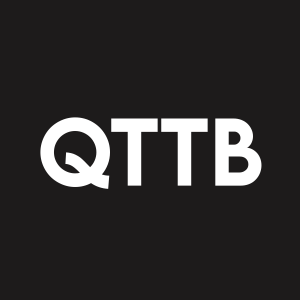Q32 Bio Presents Results from SIGNAL-AA Part A Clinical Trial Evaluating Bempikibart in Patients with Alopecia Areata at the 2025 American Academy of Dermatology Meeting
Rhea-AI Summary
Q32 Bio (Nasdaq: QTTB) presented additional results from Part A of its SIGNAL-AA Phase 2a clinical trial evaluating bempikibart in patients with alopecia areata at the 2025 AAD Meeting. The trial demonstrated encouraging improvements in SALT reduction at week 24 and continued effects after dosing cessation.
Key findings include:
- 16% mean SALT score reduction in bempikibart group vs 2% in placebo at week 24 (p=0.045)
- Continued response improvement through week 36 despite only 24 weeks of treatment
- Two patients showed ongoing responses at week 55, suggesting potential remittive effects
- Favorable safety profile with no Grade 3 or higher treatment-related adverse events
The company plans to initiate an open-label extension study and SIGNAL-AA Part B in 1H'25, with topline data expected in 1H'26. Part B will include a loading dosing regimen and longer treatment period of 36 weeks with follow-up through week 52.
Positive
- Statistically significant 16% SALT score reduction vs 2% placebo at week 24 (p=0.045)
- Durable response with continued improvement after treatment cessation through week 55
- Clean safety profile with no Grade 3+ treatment-related adverse events
- Strong patient interest with multiple requests to re-initiate treatment
- Development program on track with two studies planned for 1H'25
Negative
- Modest efficacy with only 16% mean SALT reduction at week 24
- Small trial size with only 41 patients in modified intent-to-treat population
- Only 9% of patients achieved SALT score ≤20 at week 24
Insights
Q32 Bio's SIGNAL-AA Part A trial results for bempikibart in alopecia areata (AA) demonstrate statistically significant efficacy with a 16% mean SALT score reduction versus 2% for placebo (p=0.045) at week 24. While this primary endpoint was met with statistical significance, the 16% efficacy margin appears modest compared to other AA treatments on market.
The most compelling aspect is the durability of response after treatment cessation. Despite only 24 weeks of dosing, improvements continued through week 36 in the formal follow-up period, with some patients showing ongoing responses through week 55 – approximately 7 months post-treatment. This suggests potential disease-modifying properties, which would be a significant differentiator in the alopecia market.
In patients with severe disease (baseline SALT 50-95), efficacy was more pronounced with a 25% SALT reduction at week 24. The safety profile appears favorable with no Grade 3+ treatment-related adverse events or related viral infections.
The mechanistic data showing reductions in Th2 biomarkers (TARC, IgE, eosinophils) and expected modulation of T-cells supports the dual IL-7/TSLP inhibition mechanism. This suggests bempikibart is working as designed to restore immune homeostasis.
Q32 Bio is advancing a comprehensive development strategy including an open-label extension and SIGNAL-AA Part B featuring a loading dose regimen, longer 36-week treatment period, and 52-week follow-up. This enhanced protocol could potentially improve upon the modest initial efficacy results while maintaining the promising durability signals.
The SIGNAL-AA Part A results reveal bempikibart's unique immunomodulatory approach targeting both IL-7 and TSLP signaling pathways. What distinguishes these findings is not the 16% mean SALT reduction at week 24 (which is modest compared to JAK inhibitors), but rather the continued improvement after treatment cessation.
This post-treatment response deepening suggests fundamental immune rebalancing rather than mere symptom suppression. The mechanism appears to involve T effector memory cell rebalancing and T regulatory function restoration, creating potentially durable remission—a concept previously demonstrated only in preclinical models but now observed in humans.
The biomarker data confirms mechanism of action with decreases in TARC, IgE, and eosinophils (Th2 pathway markers) alongside expected CD3+ T-cell modulation. This mechanism differs significantly from JAK inhibitors, which broadly suppress cytokine signaling and typically require continuous treatment to maintain effect.
The enhanced protocol for SIGNAL-AA Part B with loading doses (200mg weekly for 4 weeks followed by Q2W maintenance) should accelerate and potentially deepen responses. The 36-week treatment window with 52-week follow-up is strategically designed to better characterize the duration of remission.
While the initial efficacy signal is modest, the safety profile is encouraging with no Grade 3+ treatment-related events. The absence of viral infections is particularly notable given the immunomodulatory mechanism, suggesting bempikibart achieves immune rebalancing without broad immunosuppression—a clinically meaningful differentiation if confirmed in larger trials.
-- Results presented in AAD late-breaker demonstrate bempikibart's encouraging improvement on SALT reduction at week 24 and continued effects after dosing cessation in patients with severe and very severe alopecia areata (AA) --
-- Durable, ongoing responses in multiple patients through week 36 follow-up period and beyond to week 55, despite only 24 weeks of dosing, suggestive of potential for remittive effect; multiple inbound patient requests to re-initiate dosing --
-- In the Phase 2a clinical trial, bempikibart was observed to be safe and well-tolerated, with PK supporting subcutaneous dosing and receptor occupancy data demonstrating desired target engagement; clinical biomarkers showed changes in Th2 biomarkers, and expected on-mechanism changes in T-cells, indicative of potent IL-7 and TSLP inhibition --
-- Bempikibart development program remains on track with open-label extension study to initiate in 1H'25; SIGNAL-AA Part B remains on track for initiation of dosing in 1H'25, with topline data expected in 1H'26 --
"We are excited to share the results from our late-breaker at AAD which includes completed 36-week data and extended follow-up of patients in long-term response who voluntarily re-consented for further assessments based on their maintenance or further deepening of responses after the end of the trial," said Jodie Morrison, Chief Executive Officer of Q32 Bio. "These findings demonstrate for the first time in patients the potential of an IL-7Rα antagonist approach to deliver durable and sustained activity and recapitulate over a decade of nonclinical research highlighting the potential of this type of sustained response in multiple animal disease models. Given these exciting findings, we have committed to advancing bempikibart as a potentially differentiated therapy for alopecia areata patients who have had limited treatment choices and, to date, no biologic option available."
"The responses of patients with longstanding and severe disease, not only at 24 weeks but several weeks after treatment withdrawal, is very provocative," said Brett King, M.D., Ph.D., of Dermatology Physicians of
Results from SIGNAL-AA Part A Phase 2a Clinical Trial:
SIGNAL-AA Part A is a Phase 2a, randomized, double-blind, placebo-controlled, multi-center clinical trial evaluating bempikibart in adult patients with severe and very severe AA (baseline Severity of Alopecia Tool (SALT) scores of 50-100) treated over 24 weeks, with follow-up through 36 weeks. The trial is being conducted to evaluate the efficacy and safety of bempikibart 200 mg administered subcutaneously (SC), every-other-week (Q2W) compared to placebo. SIGNAL-AA Part A comprised of 41 patients in the modified intent-to-treat population and 27 in the per protocol population, with a primary endpoint of the mean relative percent change in SALT score at 24 weeks compared with baseline, with follow-up in a 12-week post-treatment period through week 36. Additional data has been collected on patients after week 36, with follow-up on multiple patients through week 55 to date, and additional long-term follow-up ongoing.
Highlights on the per protocol basis from the 2025 AAD late-breaking presentation include:
During the on-treatment window:
- At week 24: Patients with a SALT score of 50-100 treated with bempikibart (n=23) showed a mean reduction in SALT score of
16% vs a reduction of2% in the placebo group (n=4). A Wilcoxon Rank Sum test yielded a p-value of 0.045. - At week 26: Patients with severe and very severe disease treated with bempikibart showed a mean reduction in SALT score of
18% in the bempikibart group vs a reduction of2% in the placebo group. - At week 24:
9% of bempikibart patients with severe and very severe disease achieved a SALT score less than or equal to 20 compared to0% in placebo. - At week 26:
14% of bempikibart patients with severe and very severe disease achieved a SALT score less than or equal to 20 compared to0% in placebo. - In the subset of patients with severe disease (baseline SALT 50-95):
- At week 24: patients treated with bempikibart (n=15) showed a mean reduction in SALT score of
25% improving to27% at week 26. - At week 24:
13% of bempikibart patients achieved a achieved a SALT score less than or equal to 20, compared to0% in placebo, improving to21% at week 26 vs0% in the placebo group.
- At week 24: patients treated with bempikibart (n=15) showed a mean reduction in SALT score of
During the post-treatment follow-up period:
Despite only 24 weeks of treatment across bempikibart treated patients, a deepening response, as measured by mean SALT improvement, was observed following dosing cessation (week 24) through the post-treatment follow-up period (week 36), a paradigm believed to be associated with IL-7 on-mechanism modulation of rebalancing T effector memory cells and T regulatory function.
- At week 36, across patients treated with bempikibart, a mean reduction in SALT score of
20% was observed. In the subset of patients with severe disease, at week 36, the mean reduction in SALT score was28% .
Additional post-treatment data collection remains ongoing, including longer-term follow-up of patients following the completion of the trial (post 36 weeks). Outreach was made to patients regarding the post-treatment experience and patients willing to participate were re-consented.
- Amongst patients responding to outreach that completed the treatment period and showed a SALT response during the trial (n=12), all achieved maintenance of response or further hair growth in the post treatment period (post 24 weeks), including after the end of the trial (post 36 weeks).
- All 12 were confirmed by SALT assessment by the investigator, with a median follow-up of 41 weeks to date (17 weeks post last treatment) with additional follow-up ongoing.
- Of these, seven patients (7/12) showed additional hair growth by SALT assessment post-treatment, with median follow-up of 44 weeks to date (20 weeks post last treatment) with additional follow-up ongoing.
- At week 55: two patients demonstrated improved and ongoing responses approximately seven months following dosing cessation, supporting the potential for remittive effect and durability of response with bempikibart.
Bempikibart demonstrated a well-tolerated safety and tolerability profile, with no Grade 3 or higher adverse events related to treatment. Further, no related viral infections were reported in the bempikibart group.
In addition, in the Phase 2a clinical trial, bempikibart at 200mg Q2W SC demonstrated favorable pharmacokinetics (PK) and target engagement as demonstrated by substantial reductions in biomarkers of Th2 and expected modulation of T-cells. The reduction in Th2 biomarkers included TARC, IgE and eosinophils. CD3+ T-cells were reduced as expected with target engagement and IL-7Rα blockade. Q32 Bio believes these results demonstrate that bempikibart is a potent inhibitor of both TSLP and IL-7.
"In addition to the meaningful mean SALT reductions through week 24, we observed deepening responses throughout the follow-up period through week 36 and longer, despite dosing only through 24 weeks, including two patients with continued response at week 55, approximately seven months following dosing cessation," said Jason Campagna, M.D., Ph.D., Chief Medical Officer of Q32 Bio. "Our development program for bempikibart is designed to expand on these results, first with our open-label extension allowing for longer term dosing and follow-up, and second, with SIGNAL-AA Part B which introduces a loading dosing regimen, longer dosing period and longer follow up. SIGNAL-AA Part B is intended to support advancement into pivotal trials upon completion, pending review of the results."
Bempikibart Phase 2 Development Program:
Q32 Bio is advancing a comprehensive development program evaluating bempikibart in AA. Based on re-consent rates for continued follow-up and strong interest from SIGNAL-AA Part A patients to re-initiate dosing, Q32 Bio plans to initiate an open-label extension (OLE) following the same bempikibart dosing regimen leveraged in Part A to enable longer-term follow-up of patients. Initiation of the OLE remains on track for the first half of 2025.
In addition, Q32 Bio is advancing bempikibart in the Part B portion of the SIGNAL-AA Phase 2a clinical trial. SIGNAL-AA Part B is an open-label clinical trial, dosing patients with bempikibart for 36 weeks, with follow-up out to 52 weeks, in approximately 20 evaluable patients with severe or very severe AA. Dosing will include an initial loading regimen of 200mg of bempikibart dosed weekly over four weeks, followed by a maintenance dose of 200mg every-other-week over a 32-week period for a total of 36 weeks. Efficacy will be evaluated on the basis of mean percentage change from baseline in SALT scores as well as the proportion of subjects achieving various relative and absolute SALT improvements.at week 36, with follow-up through week 52. The trial is intended to support advancement into pivotal trials upon completion, pending review of the results. Q32 Bio expects to initiate Part B in the first half of 2025 and report topline data in the first half of 2026.
A copy of the AAD late-breaking presentation is available on the Presentations and Publications page of Q32 Bio's website.
About Q32 Bio
Q32 Bio is a clinical stage biotechnology company whose science targets potent regulators of the adaptive immune system to re-balance immunity in autoimmune and inflammatory diseases.
Q32 Bio is advancing bempikibart (ADX-914), a fully human anti-IL-7Rα antibody that re-regulates adaptive immune function for the treatment of autoimmune diseases, in a Phase 2 program. The IL-7 and TSLP pathways have been genetically and biologically implicated in driving several T cell-mediated pathological processes in numerous autoimmune diseases.
For more information, visit www.Q32Bio.com.
Availability of Other Information About Q32 Bio
Investors and others should note that we communicate with our investors and the public using our company website www.Q32Bio.com, including, but not limited to, company disclosures, investor presentations and FAQs, Securities and Exchange Commission filings, press releases, public conference call transcripts and webcast transcripts, as well as on X (formerly Twitter) and LinkedIn. The information that we post on our website or on X or LinkedIn could be deemed to be material information. As a result, we encourage investors, the media and others interested to review the information that we post there on a regular basis. The contents of our website or social media shall not be deemed incorporated by reference in any filing under the Securities Act of 1933, as amended.
Forward-Looking Statements
This communication contains forward-looking statements within the meaning of the
Forward-looking statements are based on management's current beliefs and assumptions, which are subject to risks and uncertainties and are not guarantees of future performance. Such risks and uncertainties include, among others, the risk that additional data, or the results of ongoing data analyses, may not support our current beliefs and expectations for bempikibart, including with respect to the durability of clinical responses, future clinical studies, including that the OLE may not be initiated by the first half of 2025 and that Part B of the SIGNAL-AA Phase 2a clinical trial may not be initiated by the first half of 2025, may not be completed by the first half of 2026 or at all, might be more costly than expected or might not yield anticipated results, and such other risks and uncertainties identified in the Company's periodic, current and other filings with the
Contacts:
Investors: Brendan Burns
Media: Sarah Sutton
Argot Partners
212.600.1902
Q32Bio@argotpartners.com
![]() View original content to download multimedia:https://www.prnewswire.com/news-releases/q32-bio-presents-results-from-signal-aa-part-a-clinical-trial-evaluating-bempikibart-in-patients-with-alopecia-areata-at-the-2025-american-academy-of-dermatology-meeting-302396270.html
View original content to download multimedia:https://www.prnewswire.com/news-releases/q32-bio-presents-results-from-signal-aa-part-a-clinical-trial-evaluating-bempikibart-in-patients-with-alopecia-areata-at-the-2025-american-academy-of-dermatology-meeting-302396270.html
SOURCE Q32 Bio








